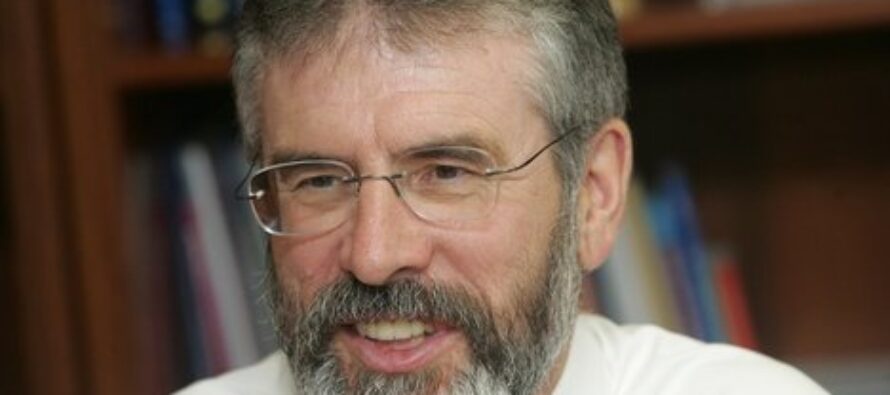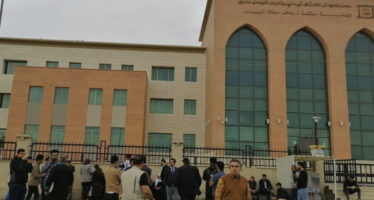Grasp the opportunity

![]()
GERRY ADAMS

The statement by ETA on Monday that it is committed to ‘a permanent and general ceasefire which will be verifiable by the international community’ has the potential to propel the efforts for peace in that region significantly forward. But it will require political will by all of the main political players, in particular the Spanish government, if the opportunity that now exists is to be grasped.
This week’s statement is the latest in what has been a difficult process to create the right political conditions for meaningful negotiations and a new beginning in the relationship between the Basque country and the Spanish state.
Along with others in the international community Sinn Féin has been involved in ongoing conversations with Basque representatives. These have taken place in Ireland and Europe.
Many in the Basque country have taken a close interest in the peace process in Ireland. They hope to learn from the Irish experience in an effort to advance their own peace process.
The collapse of the ETA cessation in 2006 led to caution in some quarters about the new cessation declared in September last year. While that may be understandable it is no justification for preconditions to dialogue.
In my view a failure to seize opportunities and to build on initiatives led to the Irish peace process taking much longer to make progress than it should have. At times arguments over words and their interpretation were elevated to pre-conditions which in some instances almost led to the destruction of the process.
This should be avoided in the Basque situation.
Monday’s statement follows ETA’s announcement on September 5th that it had taken a decision to halt “offensive military action”. On that occasion ETA said that new political conditions existed and that it was time to build a democratic framework for the Basque country.
ETA reaffirmed its commitment to a democratic solution that would allow the Basque people, through dialogue and negotiation, to decide their own future.
A few days later ETA issued a second statement aimed primarily at the international community. In its statement ETA acknowledged the positive contribution of many international figures in helping to move the situation forward. ETA called on the international community to continue to be engaged in the process and committed itself to take further steps to enhance a democratic process that could lead to a just and lasting solution of the conflict.
All of these developments did not happen by chance. They came at the end of a long process of internal sstrategising among Basque parties, trade unionists and political activists. Thousands of activists were involved.
Last February a conference of the Abertzale Regional Assemblies (Abertazle Left), which includes the banned Basque party Batasuna, agreed a new broad front approach. This too draws heavily from the Irish experience.
The new strategy commits Basque participants to ‘exclusively political and democratic means’ and seeks to achieve political change ‘in a complete absence of violence and without interference’ and ‘conducted in accordance with the Mitchell Principles.’ This strategy finds its echo in the statements by ETA since September.
And two weeks ago the imprisoned leader of the banned Basque party Batasuna told the Wall Street Journal that Batasuna rejects violence as a means of attaining political objectives.
So, the ETA statement should not be judged in isolation. It is part of a long and significant process of discussion and debate among Basque activists. It is a serious effort to make progress through peaceful and democratic means and should be encouraged.
It is now vital that the Spanish government respond positively to this statement and quickly establish inclusive political negotiations.
There is also a need for confidence building measures from the Spanish government to create a better climate for progress. For example, Arnaldo Ortegi should be released. Arnaldo is a key leader of the Basque independence movement. He is a committed supporter of the need to develop a democratic process in the Basque Country. His continued imprisonment is unjust. It is also an obstacle to the development of a process for peace making and positive change.
The Spanish government should also immediately lift the restrictions imposed upon political activists in the Basque Country and in particular the ban on the political party Batasuna. This is the time for encouraging democratic politics.
And it would be important that the government end the harsh prison regimes imposed upon imprisoned Basque activists and initiate a programme to address all of the issues of concern to prisoners and their families.
Peace processes are challenging. Especially for governments. But they are better than war. And as the Irish peace process proves, against all the odds, they can succeed.
Related Articles
El primer día en La Habana sin Fidel
![]()
La Ciudad de La Habana está envuelta ese sábado por la mañana con un silencio inusual y extraño
11 de septiembre de 1973
![]()
Editorial El Siglo A muchos les incomoda la sola mención de la fecha. Se ha intentado echar tierra a los
3 journalists and 2 activists sentenced to prison in Hewler
![]()
Three journalists and two activists in Hewler, the capital of the Kurdistan Region, were sentenced to 6 years in prison each over the same charges, facing reaction from many parliamentarians.




